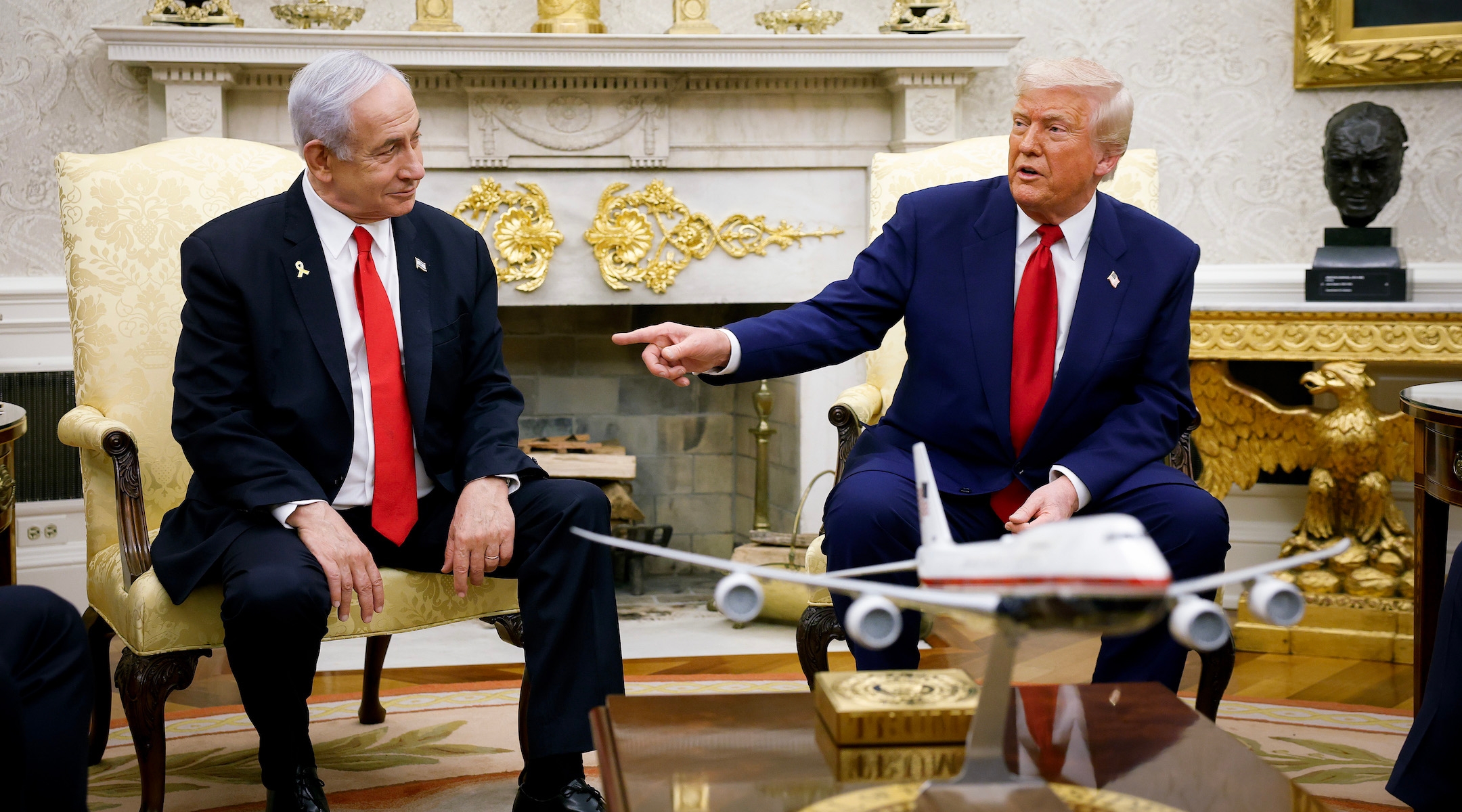US reaches truce with Houthis hours after Israel bombs their airport in Yemen
Israel was reportedly not notified of the ceasefire in advance

U.S. President Donald Trump, accompanied by Israeli Prime Minister Benjamin Netanyahu, speaks during a meeting in the Oval Office of the White House on April 7, 2025 in Washington, DC. Photo by Kevin Dietsch/Getty Images
(JTA) — Israel and the United States often emphasize their close alliance, and for nearly two months, both countries were simultaneously attacking Yemen’s Houthi terror group, which has been bombing Israel as well as U.S. ships.
But that alignment in Yemen ended abruptly on Tuesday, shortly after Israeli jets bombed a Houthi airport in Yemen’s capital in retaliation for a successful missile strike on Israel’s Ben-Gurion Airport on Sunday. Hours later, President Donald Trump announced in the Oval Office that the United States and the Houthis had reached a truce.
That truce, mediated by Oman, did not include Israel, which reportedly hadn’t even been given advance warning of the deal.
“We had some very good news last night: The Houthis have announced that… they don’t want to fight anymore, they just don’t want to fight, and we will honor that,” Trump said in an Oval Office meeting alongside the Canadian prime minister. “And we will stop the bombings, and they have capitulated, but more importantly we will take their word: They say they will not be blowing up ships anymore.”
The agreement comes at a tense time for Israel, which is reeling from the disruption wrought by Sunday’s strike and from months of intermittent attacks from the Houthis. Several airlines have canceled flights to the country.
On Tuesday, Israel retaliated with a strike that, its military said, “disabled” the airport in Sanaa, which is controlled by the Houthis.
“I have a simple principle: Eyes for an eye, and teeth for a tooth,” Israeli Prime Minister Benjamin Netanyahu said in a video on Tuesday. “Whoever attacks us, we attack them sevenfold.”
The Houthis have been shooting bombs and drones at Israel since Hamas’ Oct. 7, 2023, invasion, which launched the war in Gaza. The Houthis have also bombed U.S. and other ships in the Red Sea, disrupting global shipping lanes.
The Houthis, like Hamas, are funded by Iran, and Israel has bombed Houthi targets in Yemen in response. Israeli defenses have intercepted most of the group’s attacks, though some, like Sunday’s have evaded Israel’s protections.
That fight looks likely to continue — and will now proceed without U.S. involvement. Trump did not reference Israel in his remarks, but both the Houthis and the U.S. State Department made clear that the agreement does not commit the terror group to stop its attacks on Israel.
In response to a question about whether the agreement mandates an end to Houthi-Israel fighting, State Department spokesperson Tammy Bruce said, “This is about the Red Sea, the attacking of ships, and the nature of the action that the United States had taken.”
Following the announcement of the truce, a Houthi official said Israelis should “remain in shelters because their government will not be able to protect them,” which signals that the attacks will continue.
Israeli officials did not appear to immediately comment on the truce, which comes at a time of other tensions between the White House and Israel, principally over U.S. negotiations with Iran about its nuclear program. Ron Dermer, an Israeli cabinet minister and Netanyahu confidant, was due to meet with Trump administration officials Wednesday, ahead of Trump’s trip to the Middle East. Trump is not currently scheduled to stop in Israel.
Before Trump’s announcement, Louisiana Sen. John Kennedy, a Republican, had told Jewish Insider about the Houthis that the “president needs to turn them into fish food.” That’s unlikely to happen now. But South Carolina Sen. Lindsey Graham, a supporter of Israel and close Trump ally, urged Israel to continue its own attacks.
He also suggested that Israel attack Iran — an idea that Trump has reportedly rebuffed.
“To my friends in Israel, do what you have to do to protect your airspace and your people,” Graham tweeted. “It is long past time to consider hitting Iran hard. It wouldn’t take much to put Iran out of the oil business.”













